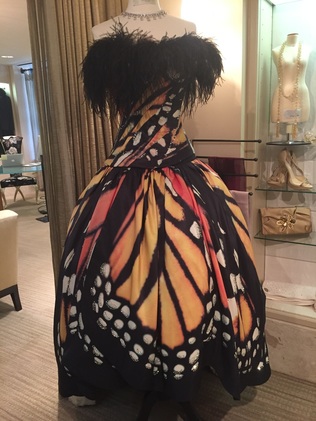
In an early scene in the movie Pretty Woman, Julia Roberts’ character enters an exclusive clothing store on Rodeo Drive in Los Angeles. She’s a down-on-her-luck hooker. Richard Gere’s character, an extraordinarily rich businessman, has handed her a wad of cash and told her to buy an outfit for the evening, but the store’s two saleswomen refuse to wait on her. They pretty much throw her out of the store, telling her that she doesn’t belong there. It’s painful to watch. (Happily, there’s payback later in the movie.)
Roberts’ character enters the store oblivious to the scorn she’s about to engender. But for some of us, visiting an establishment that markets pricey couture clothing is nothing short of terrifying. I know, I know, you may have no idea what I’m talking about. But class distinctions still shadow some of us. I grew up in an immigrant family, with parents who turned frugality into an art form. My mother had lived through World War II in England, and the deprivations of that time marked her. (She would squirrel away leftover pats of butter in her purse on our rare visits to a restaurant.) We were clothed from thrift store gleanings, long before it was in any way fashionable to forage for the vintage.
The trappings of the well-off were foreign to me, and frightening. I had no training in how to act in situations where wealth and advantage were taken for granted. Nowadays, my life is very different, but my history remains intact. As comfortable as I may be with my life now, I cringe a little at my belief that I’d still be horribly out of place in the halls of the rich and famous, sticking out like the proverbial sore thumb.
And so, this week, I put myself to the task of entering a couture studio and having a significant interaction. For years I’ve walked past the Luly Yang couture store in the graceful Fairmont Hotel in downtown Seattle. In the picture windows, formal gowns ranging from the demure to the outrageous face the street. These gowns are amazing. Up to now, I’ve admired them from afar but I’ve never entered the store. One of Luly Yang’s signature creations is in this store: the Monarch Butterfly dress, a couture formal silk corset and petaled skirt that clearly evokes the butterfly. It’s theatrical and magnificent. I decided I would go to the store and ask to try on the dress.
Again, I know, some of you will think that this isn’t much of a new adventure. But like trees, we bear the marks of our years inside us, no matter what our exteriors now show. If you cut a tree in half, you can tell the years that the tree suffered from lack of water or environmental stress from the size and quality of the growth rings for those years. Those rings never go away, even though they may be covered up with new robust growth. Like trees, our past is always inside of us, always with us. For me, walking into that store was just plain scary.
The store is compact and quiet, with pale beige carpet and small glass tables. One of the two saleswomen, both clothed head to toe in black, asked if she could help me. I’m just here to look at your lovely dresses, I said. She smiled and told me to let her know if I needed any help.
I wandered through the store. Half the store is devoted to exquisite wedding dresses. The other half is primarily for evening wear, of the very showy kind: lots of satin. I glanced at a few price tags. Each piece I looked at was priced at thousands of dollars.
The original butterfly dress rests there, the central showpiece of the collection. I chatted with the saleswoman about it. She was friendly and charming, not frightening at all. She told me that the they could customize a new gown like it for me, but that the original could also be rented. In the end, I didn’t ask to try it on. I just didn’t want to, after all.
When I got home, I found I was curious about renting the butterfly gown—a purely theoretical curiosity, since I certainly had nowhere to wear it—so I emailed the store about what it cost to rent. They responded that they had made a mistake and the dress was not in fact now available for rental, but that I could buy it for $25,000.
Well, as you may guess, I’m not buying the butterfly dress.
The whole experience, though, was remarkably empowering. Analytically, I know that there is absolutely no reason why the salespeople would be cold or rude to me. I looked perfectly respectable. But inside I am still carrying that uncertain fearful girl in thrift store duds, devoid of self-confidence, the girl who got picked on because of her funny accent and her bad clothes. She’ll always be in there, a ring in my tree that’s a little shriveled and puckered, but today she has a hint of a smile.
 RSS Feed
RSS Feed
